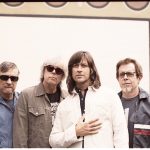Rhett Miller on How to Do Magic: Songwriting Made Simple

Photo by Ebru Yildiz
Songwriting is magic.
When you sit down, there is nothing but silence and empty space. When you stand up, there is a song. Something from nothing. The rabbit from the proverbial hat. Only it’s better than any rabbit. It’s a living, breathing song.
The craft of songwriting is best approached as an honest-to-god craft. It is work. While some of the best songs may have been written in mere minutes, the best songwriters are the ones who have put in the requisite 10,000 hours in order to gain their expertise.
My first songs were terrible. I finished no fewer than a hundred songs before I wrote one song that succeeded, which isn’t to say that it was great. It was adequate, good enough. It worked. The hundred songs before it did not work. The great thing was that I could feel it when I hit upon the one that finally worked. And it felt fantastic.
Where does a set of lyrics begin? How does one go from blank page to watching words pile up on top of each other until they resemble a song?
I have found two distinct pathways.
The first is trickier, and involves stumbling around blindly, free-associating and drifting along a stream of consciousness. Words suggest other words, hinting at possible melodies. A story may or may not take shape, but if the thing is working, a mood begins to emerge. A world is created.
That is the world the listener will live in for the duration of the song. Is it a shadowy place? Is it a bright place? As the song’s first audience, you, the writer, will feel that mood and must be open to it, and nurture it. Like so many worthwhile pursuits, this process is delicate.
In this free-flowing style of songwriting, the idea or question of what the song “means” is not worth dwelling on. In fact, if you start worrying about the meaning of the song, you can kill the momentum you have created. In this style of songwriting, images rule the day, evocative and suggestive.
As is the case in any style of songwriting, perhaps writing in general, the details will do the work. Like every creative writing teacher says on day one: SHOW, DON’T TELL. Lead me gently to the conclusion, pointing out evidence along the way until I say, “A-ha!” Make me think that I got there on my own.
In the stream-of-consciousness style of songwriting, you are a conduit, open and nonjudgmental. The words pour out of you. It’s like speaking in tongues. And while you are doing it, you are feeling what the eventual listener will feel. You will be surprised by phrases that emerge. You will laugh when something comes from nowhere and strikes you as funny.
And, ideally, you will feel something. Be aware of these feelings. They will lead you to the next line, the next section, and, most importantly, to the chorus.
The chorus is the thesis statement of your song. The chorus is the apex moment. I cannot overstate the importance of a strong chorus.
The chorus is the star of the film you are directing in the mind of your listener. The chorus will bear repetition. It must bear repetition because it will be repeated. None of this is to say that the chorus has to contain some ham-fisted lesson or pedantic announcement.
I know that for my taste if someone is making self-assured proclamations about how the listener needs to live his or her life, I check the heck out. No thank you. I rarely find myself enjoying any song in which the narrator announces, “love is … .”
[Full disclosure, though: Like all rules, I break this rule all the time.]
In this imagistic, stream-of-consciousness style, as you are writing you must also be listening. You must be aware of the journey on which the song is taking the listener. And you must listen critically, negatively sometimes. Some words don’t sound right. Kill those words without hesitation. Be brutally honest with yourself. If you have to talk yourself into letting something remain in your lyrics, it usually means the offender should be dispatched unceremoniously.
There will also be transcendent moments in the song, moments that jump out, words that elevate themselves above the others, phrases that work in a way that make them stand out from the rest of the song. These are the most important moments. These will become your refrains, your choruses, your hooks.
I have a theory that every truly great song contains in it a moment that transcends the brilliance that is the rest of the song. In other words, a song that is consistently great is one thing, but the best songs maintain a consistent level of greatness while, at the same time, boasting at least one truly ecstatic, epiphanic moment as well.
No big deal, right? Consistently great with one moment of absolute brilliance.
I must emphasize that this is not what we accomplish, but what we strive for. We are lucky if we ever even get close.
In contrast to the seat-of-your-pants, stream-of-consciousness style of songwriting, there is a more clearheaded approach. This other style usually starts with a strong, easily stated idea and works backwards. Often the chorus appears to the writer before the rest of the song in this style of composition.
The songs that come out of this process tend to be more decipherable. The story is less opaque, the lyrics less obtuse. The listener can usually comprehend the song’s subject matter more fully with this type of song.
Writing a song with a clear idea and straightforward presentation involves just as much intuition and inspiration as writing in the stream-of-consciousness style, but the end product is kept within tighter parameters. Certainly, traditional folk songs that tell stories of tragic shipwrecks and social injustices are born of this type of songwriting. A newspaper story transformed into a song, like “The Wreck of the Old 97,” for instance, would require this sort of focus and discipline. Images and details still abound, but the vision is directed specifically toward a clear idea rather than skipping wildly about the interior of the songwriter’s consciousness.
Songs born of a clear idea or straightforward story can be moving and evocative. Some of my favorite songs fall into this category. But during my long years of doing this weird job, I’ve found that my favorite way to write is to let the song guide me and surprise me, to let the song stray into obtuseness or even nonsense.
You will find the style that works for you. You will know when you have landed on it because it makes you feel good.
The point of songwriting is to feel good. Maybe from that you will make others feel good. Maybe you will even make a buck here or there. But don’t make it about other people or, god forbid, money. Songs born of calculation or avarice will reek of desperation and won’t connect with listeners. As with so many undertakings, that’s the great irony: Trying too hard ensures failure.
A good songwriter has strong instincts and trusts them. A good songwriter knows that work counts more than talent. A good songwriter watches people obsessively, knowing that moments between human beings are fraught with tension, which is grist for the mill of songwriting. We are creating something out of nothing, but we are pulling from everywhere.
We are watching the starry-eyed lovers in the park, the silent old folks in the booth at the restaurant, the nervous librarian behind her desk, the jolly ticket taker on the train, the gorgeous bookworm in the back of the bus, the surly president, and the beatific housekeeper. Every song needs characters. Every song is an examination of the human condition. Every song is a study in what it means to be conscious, what it means to feel, what it means to live and to someday die.
Songwriting is magic. But it’s the kind of magic you can learn to do. Trial and error. Paying attention. Listening to the music, and the rhythm, and the language of the world around you. Once you have reached the point where your songs are working, your audience will look at you as if you are actually performing magic. And maybe you are.
I hope you try it. In my short time on this globe, I’ve found no more rewarding pursuit, no more fulfilling distraction, no more direct path to the divine.
I can’t wait to hear what you come up with.




